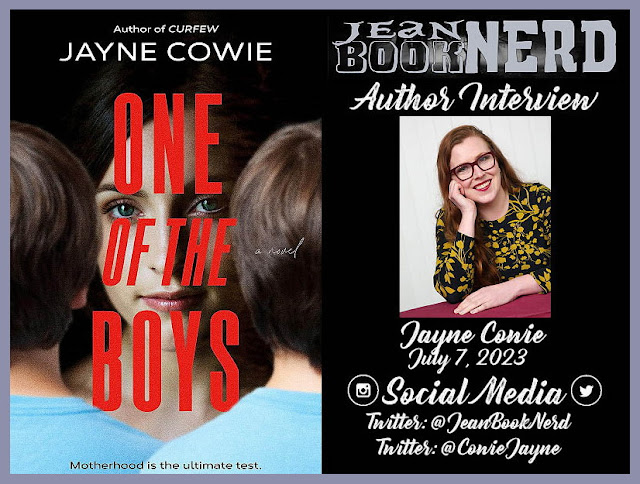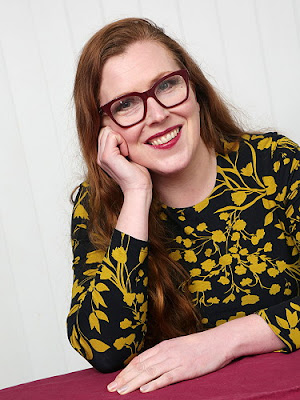Photo Content from Jayne Cowie

Greatest thing you learned at school.
The importance of reading books that challenge you, not just in terms of reading level, but also because of the ideas they contain within them, and the lives they describe. I remember being made to read MiddleMarch by George Eliot at Secondary School and finding it incredibly hard going. It’s a very long book, almost a thousand pages, and the language is dated. It wasn’t a book I would have read voluntarily at fifteen. But I was definitely shaped by the experience. And I think that it’s important to know where we’ve come from and what we’ve left behind as society changes.
Defining moment during your youth when you realized you wanted to be a writer.
I had a moment when I was a teenager when I decided that I wanted to write a novel, but I didn’t get beyond the first couple of pages and nothing really came of it. I think the urge lasted for about two days and then homework got in the way. I then completely forgot about it until I was in my early thirties and at home with two very young children, when I decided to have another go, just to see if I could do it. I had a laptop, a library card, and naptime. The end result was terrible, because I had no idea what I was doing, but I’d done it, and so I kept going.
What fiction most influenced your childhood, and what effect did those stories have on ONE OF THE BOYS?
I was a voracious reader as a child and read pretty much anything that wasn’t nailed down, but the books that have stayed with me are Judy Blume’s. I love Judy. Are You There God, It’s Me Margaret, although a bit outdated now, is still for me one of the most important books ever written for adolescent girls. It’s always talked about as the period book, but it’s really about the time just before a girl hits that landmark, when she knows it’s coming but doesn’t know when, and an exploration of those feelings, the anticipation and excitement, and also the fear. Judy showed me that you can find magic in the ordinary, which is something that definitely influenced me. One of the Boys is on one level about this technological advance which changes society, but on another level, is also about what it means to face the highs and lows of an ordinary life with this technology as a backdrop.
What’s one thing that readers would be surprised to find out about you?
I’ve never seen ET. My mum took me to the cinema watch it when I was little and I was so scared in the first couple of minutes (when they’re running through the forest) that we had to leave. I’m still traumatized by it.
Has reading a book ever changed your life? Which one and why, if yes?
I read a book called Invisible Women by Caroline Criado Perez a few years ago, and that totally changed the way I viewed the world and the questions that I ask when I’m dealing with doctors, for example. The book is about the data that has been used to make decisions governing how we build our societies, and all the ways in which women and female bodies have been deliberately excluded from it. I recommend it to everyone.
Are there authors that you’re excited to engage/work with?
I would love to connect with Barbara Kingsolver, because her characters are amazing. I also wish that I had been able to meet Hilary Mantel before she died.
Which character have you enjoyed getting to know while writing ONE OF THE BOYS?
My favourite character in the book is Bea, because she’s a tough cookie. It was interesting to see what drove her, and how she justified making decisions which often went against what those around her were doing. She’s very independent and stubborn, but she also has a very strong maternal instinct and is driven to protect her son Simon as best she can, though she often gets it wrong.
TEN RANDOM FACTS ABOUT ONE OF THE BOYS
- 1. The test itself and the drugs used to treat it are all entirely fictional.
- 2. There were multiple title changes along the way, one of which was because there was another book with the same title due to be published in the same month.
- 3. Like Bea, I intended to change Simon’s name, but it stuck.
- 4. I wrote most of the book listening to an English singer called Sam Fender, who really helped me to capture the young male voice.
- 5. The idea of the farms came from reading Nomadland by Jessica Bruder – the work is out of the way, physically very hard, relentless, badly paid, and preys on those who have no financial alternative, and the rest of us stand to one side and continue to feed the beast.
- 6. I chose Cornwall as the destination for Bea and Antonia’s holiday because that’s where I went on holiday as a child.
- 7. Flash the dog is named after Flash Gordon.
- 8. Antonia has a white baby grand piano in her house, but it’s just for show. None of them can play it.
- 9. I had a very detailed plan before I started writing, and there were still twists I hadn’t anticipated that surprised me along the way.
- 10. I don’t know if I would have my son tested.
Two things, really – don’t give up your day job, or at least make sure you have something else going on that will enable you to pay the bills, because the income of a published author is very unpredictable and sadly often quite low. I once ran a creative writing class at a local library and one of the attendees said that he’d quit his job to start a career as a novelist, the plan being to have a book written and be selling enough copies to have a decent income in three months. I tried to let him down gently. And second – quit social media. It might make you feel like you’re connected to the publishing community, and that your twitter following is the difference between published/not published, but that really isn’t true. The time would be far better spent developing your writing skills and reading as widely as you can.
What is the best piece of advice you ever received from another author?
A story is more than just a sequence of consecutive events. I was a couple of years into my writing journey when I first heard that. I’d written several unpublishable manuscripts and felt that I was getting better, but I also knew that my stories fundamentally didn’t work, though I wasn’t sure why not. That single throwaway comment, which I heard at a writer’s conference, set me on the track to learning about and starting to really understand plot, and that made all the difference.
What were your inspirations for the character development?
Because the story is what is often called ‘high concept,’ the characters evolved from the basic premise – would you have your newborn son tested for a genetic predisposition to violent behaviour? That immediately narrows the character field, for obvious reasons. From that came Antonia and Bea, two very different women who give birth to sons at roughly the same time. Antonia is well educated, wealthy, socially ambitious, and thinks the test is a good idea. Bea is the exact opposite. She’s also Antonia’s younger sister, which creates plenty of opportunities for conflict.
Because the story is what is often called ‘high concept,’ the characters evolved from the basic premise – would you have your newborn son tested for a genetic predisposition to violent behaviour? That immediately narrows the character field, for obvious reasons. From that came Antonia and Bea, two very different women who give birth to sons at roughly the same time. Antonia is well educated, wealthy, socially ambitious, and thinks the test is a good idea. Bea is the exact opposite. She’s also Antonia’s younger sister, which creates plenty of opportunities for conflict.
A mother knows best... Doesn't she?
Antonia and Bea are sisters. They are both doting mothers to their sons. But that is where their similarities end.
Antonia had her son tested at an early age to ensure her little angel did not possess the 'violent' M gene.
Bea refuses to let her son take the test. His life should not be determined by a positive or negative result.
Both of these women will go to any length to protect their sons.
But one of them is hiding a monster.
And there are going to be fatal consequences for everybody...
Antonia and Bea are sisters. They are both doting mothers to their sons. But that is where their similarities end.
Antonia had her son tested at an early age to ensure her little angel did not possess the 'violent' M gene.
Bea refuses to let her son take the test. His life should not be determined by a positive or negative result.
Both of these women will go to any length to protect their sons.
But one of them is hiding a monster.
And there are going to be fatal consequences for everybody...
jbnpastinterviews













Book i made ex
ReplyDeleteThat would be a book
ReplyDeleteMy time
ReplyDelete